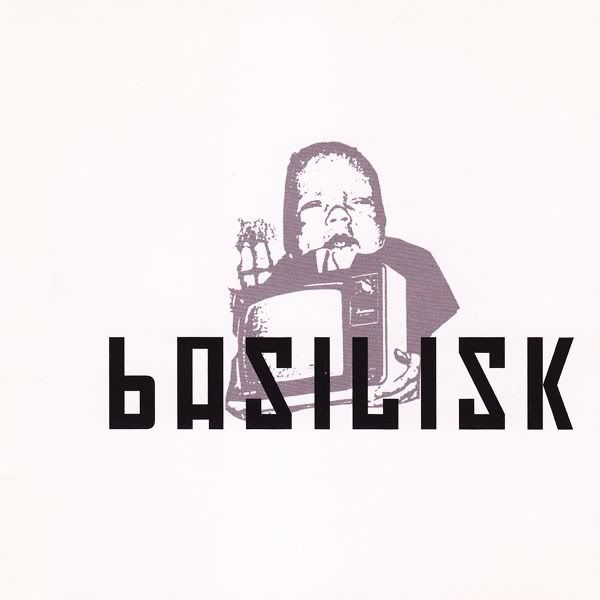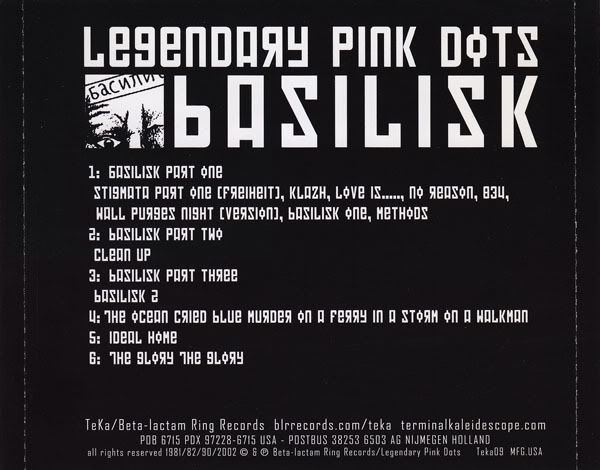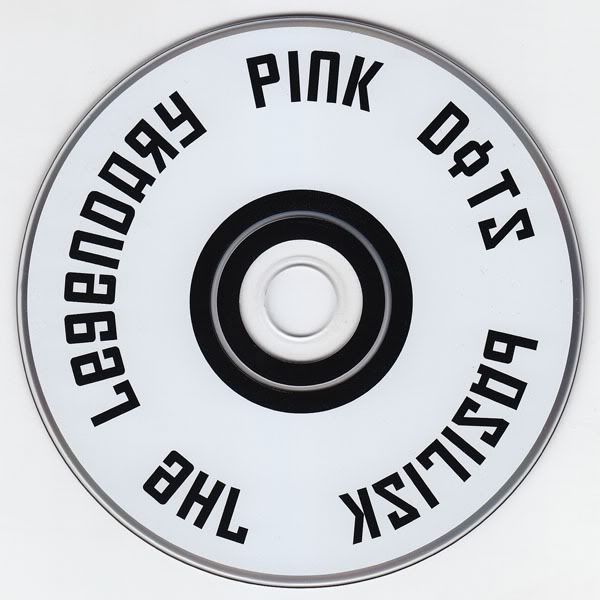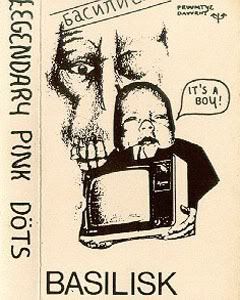"SING WHILE YOU MAY!" Are you having fun? I'm having a blast. Reevaluating the catalog of the Legendary Pink Dots after so many years is allowing me to discover parts of songs, complete tracks, or even entire albums to which I never paid enough attention. Not least of these releases is Basilisk, a 1983 cassette that was remastered and reissued by Beta-lactam Ring Records on CD in 2002, one of the last of its kind—six full years after Prayer for Aradia appeared on CD and opened up another whole world for Dots fans. As with Prayer for Aradia and Traumstadt 1, this has the individual sides still programmed together on one track position each (except for "Clean Up," which is oddly on a track of its own), while three bonus tracks have been added, none of which entirely fit the sound or even the proper vintage of the Basilisk material. For all of these reasons and more, I underestimated this release for most of the past decade, which is an absolute shame... because in listening to it, I have come to realize that Basilisk is an intriguing self-contained opus and a unique snapshot of a very specific time and place for the Legendary Pink Dots. Consider me enlightened. (There's a joke in there somewhere about enlightenment coming with a blast.)
By the way, if you don't know what a "basilisk" is, scroll to the very bottom of the page.
Basilisk

* These tracks appear on the original 1983 cassette Basilisk

Basilisk 2002 CD tray card (above) and disc (below)

Basilisk is easily the band's most coherent and self-contained cassette release. While other tapes would quietly nudge in other recent tracks that were seemingly unrelated to the artistic project at hand, all of the tracks here feel like they belong where they do, and more importantly, they all share a sound and approach that unites the tracks as one, as all good records should. This particular sound is subdued and pretty; Edward Ka-Spel conveys no mania here, and actually so many of the tracks sound like they were recorded with just his voice and an accompanying keyboard that it almost feels like the entire project is a practice run for his solo career (which was about to launch). The keyboards conjure up images of weddings and funerals, ballroom waltzes, and old time ice skating routines—not exactly the realm of edgy audio experimentalists. Yet this release is highly experimental, founded on a 26-minute ambient soundscape ("Basilisk 2") with threads of this material woven throughout the other tracks to tie them all together.
At the end of the last entry, I indicated that this release was more or less a sister release for Curse, as a couple of the tracks here sound like demos or incomplete versions of songs that already appear there. But in addition to that, the two releases are utterly complementary because they are nothing alike. Curse is rather energetic, with a handful of upbeat songs and a colorful array of sound and style varieties. Basilisk, on the other hand, kicks off with a ballad, and only raises the tempo when one song—the opener, "Stigmata Part One (Freiheit)"—literally speeds up in playback toward the end. In fact, about half of the original tape's runtime slows to arrhythmic ambience. And because the songs have an overall lethargic feeling and mood sustained throughout, this release is monochromatic, especially when compared to Curse's multifaceted prog pop.
 "SING WHILE YOU MAY!" This phrase cryptically began appearing on the back of LPD records as early as Brighter Now, and the tradition continues to this day. Basilisk begins with this motto, as a woman who may or may not be April Iliffe intones these words in a chanted loop for 30 seconds before the program begins. Then "Stigmata Part One (Freiheit)" fades in on the familiar sound of arpeggios, accompanied by the metronomic beep of what sounds like a heart rate monitor. Ka-Spel's vocals are low in the mix and he's not enunciating as clearly as usual while he describes a sculptor who hears the needs of existing statues ("Venus wanted hands, and Bonaparte a brand new hat, 'cause the old one looked so silly") but ignores them in order to focus on his current work. "Freiheit" is the German word for freedom, and it seems to apply here to the feeling the sculptor gets while he's "working fingers till the bones are working through his skin." It's an obvious metaphor for God and His creations (the statues end up mocking their creator), and although it's a near-perfect opener for the mood of this set, the song is a little too obtuse to be a classic. As if to demonstrate that Basilisk is going to continue in obtuse, unpredictable directions, "Klazh" immediately and surprisingly detours into dark ambience; there's rhythm to it, but it sounds like a drum track that has devolved into nothingness. The end result approximates the echoey sound of the air vents in an abandoned old industrial complex. It is the first hint of where the record will end up.
"SING WHILE YOU MAY!" This phrase cryptically began appearing on the back of LPD records as early as Brighter Now, and the tradition continues to this day. Basilisk begins with this motto, as a woman who may or may not be April Iliffe intones these words in a chanted loop for 30 seconds before the program begins. Then "Stigmata Part One (Freiheit)" fades in on the familiar sound of arpeggios, accompanied by the metronomic beep of what sounds like a heart rate monitor. Ka-Spel's vocals are low in the mix and he's not enunciating as clearly as usual while he describes a sculptor who hears the needs of existing statues ("Venus wanted hands, and Bonaparte a brand new hat, 'cause the old one looked so silly") but ignores them in order to focus on his current work. "Freiheit" is the German word for freedom, and it seems to apply here to the feeling the sculptor gets while he's "working fingers till the bones are working through his skin." It's an obvious metaphor for God and His creations (the statues end up mocking their creator), and although it's a near-perfect opener for the mood of this set, the song is a little too obtuse to be a classic. As if to demonstrate that Basilisk is going to continue in obtuse, unpredictable directions, "Klazh" immediately and surprisingly detours into dark ambience; there's rhythm to it, but it sounds like a drum track that has devolved into nothingness. The end result approximates the echoey sound of the air vents in an abandoned old industrial complex. It is the first hint of where the record will end up."Love Is....." is an early version of "Love Puppets" (from Curse); the song has been stripped of vocals and guitar but has gained several effects, including chirping birds and chirpy synths. The familiar portion ends in a bit of cacophony followed by a low-key synth waltz in which Ka-Spel expresses his typically downbeat views on love ("If I was the only boy in the world and you were the only girl, we'd fight like hell") in the midst of describing the haunting of a man by the lover he strangled and buried in the park. So that's what love is, eh, Edward? Thanks! The anti-love theme continues into the next song with cold aloofness. "No Reason" appears to be the motivation behind a breakup, and the song is an emotional antithesis to the self-pitying sadness of "Legacy" from Brighter Now. The drum on this track strikes solely on the third count of each measure, giving the track a plodding rhythm, while the keyboards take time out from their "organ" presets to whistle and quiver liquidly in the background. The organ sounds return for the brief interlude of "834," a vocoded spoken track with a funeral backdrop. Although the vocals are unintelligible, the concept of "834" will pop up again and again in the Dots' work and will be further explored later.
"Wall Purges Night" is a fairly straightforward live/demo run-through of the Curse track, complete with duet vocals between Ka-Spel and drummer Keith Thompson. The beat is nowhere near as prominent here and the production touches are much less polished; especially distracting is the lo-fi megaphone aspect occasionally applied to Ka-Spel's vocal, such as with the refrain, "Enlightenment comes with a blast!" The inclusion of this track amongst the others clearly shows at what point in the Curse LP's recording the Basilisk cassette may have started to come together, and perhaps the band wanted to capture a certain energy in this performance—otherwise it serves as filler.
"Basilisk 1" begins with a short sample of Winston Churchill but soon becomes an instrumental version of "Flesh Parade," the awesomely pretty song that anchors the first half of Prayer for Aradia. It's a little bit more devolved than that, with all sorts of cosmic and dubby effects flying out of it in various directions, while the chords are sustained just long enough to give the piece a slightly slow-motion bent. The effects get kind of annoying, actually, as they detract from that lovely chord progression, one of the Dots' finest. As I said before, it is no wonder the band and Ka-Spel himself both return to this song in various forms several times over the next few years. "Methods" originally closed the first side of the cassette and ends suddenly enough that it most certainly had to be a longer song edited down to fit into the two minutes of remaining space on the tape. Ka-Spel is frantically listing a number of suicide options, occasionally interrupted by an Atari-like synth while he maniacally laments, "Methods! There are methods!" The song is grim, but in typically Ka-Spelian fashion, ends up strangely amusing. Why would anybody sing about this so excitedly?!?
"Clean Up" develops out of a kaleidoscopic collage of backward effects and vocal snippets, officially announcing side two. This is reminiscent of the "Sing While You May!" intro at the beginning of side one, and the old-timey ice skating organ sound that identifies the overall feel of Basilisk rears its ugly head again here. And similar to side one, "Clean Up" is a strong opening song, lethargically declaring, "The world would be so nice without people!" It seems we caught Edward in a celebratory mood, yet again. He sounds suspiciously drunk, and by the time he mentions his adenoids, the song has already earned a very unique place in the Dots canon.

This is a basilisk, by the way. Apparently a mythological lizard king so horrible that its looks can kill, I think it's usually more dragon and less chicken than this representation would have you believe. No—a friend has just corrected me—a basilisk is usually quite cocky. (See what I did there?)
<----- GO BACKWARD to Curse

No comments:
Post a Comment